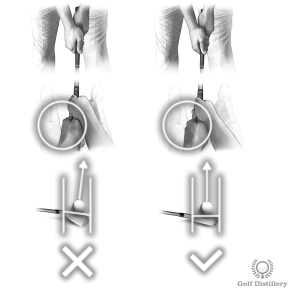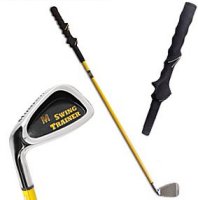How to Fix Slice 2: Check Your Grip
Golf tips
As golfers, we’ve all heard the importance of a proper grip. But if you slice the ball on a regular basis, I’d be willing to bet there’s a good chance your grip is letting you down.
 From experience, I’ve found that most amateur golfers don’t fully appreciate how much effect their grip has on the flight of the ball. And even if they do, they’re reluctant to make changes because it feels so unnatural and actually takes them several steps backwards.
From experience, I’ve found that most amateur golfers don’t fully appreciate how much effect their grip has on the flight of the ball. And even if they do, they’re reluctant to make changes because it feels so unnatural and actually takes them several steps backwards.
In this video and article, we’ll quickly recap what a good grip should look like (and how an incorrect grip can lead to severe slice and hook shots). I’ll also offer some tips to help make a new grip feel completely natural in a very short space of time.
Weak, Strong & Neutral Grips
Weak Grip
If you’ve read any golf instruction material in the past, you may have heard that a slice is often caused by what we call a weak grip.
A weak grip (for the right-handed golfer) means that the left hand is too far underneath the club and the right hand is too much on top of the club – like in the image.
If your grip is in a weak position like this, it becomes difficult to square the club face up at impact (especially for longer irons and woods) and you’re losing power.
Strong Grip
A strong grip is usually associated with a hook. But what I’ve seen from teaching thousands of club golfers is that many people that slice the ball have an overly strong grip…
 They may have developed a strong grip to try and promote more hand rotation through the ball aiming for a nice draw. But very often they end up blocking the ball out even further to the right. Or they rotate their hands too much and end up with a nasty snap-hook to the left.
They may have developed a strong grip to try and promote more hand rotation through the ball aiming for a nice draw. But very often they end up blocking the ball out even further to the right. Or they rotate their hands too much and end up with a nasty snap-hook to the left.
A strong grip (for the right-handed golfer) means that the left hand is too much on top of the club and the right hand too far underneath the club – as in the image.
Neutral (Correct) Grip
What every golfer should adopt is a neutral grip.
 A neutral grip significantly increase your chances of hitting the ball straight towards the target you’re aiming at. Just as importantly, because it’s a natural position for you hands to be in, a neutral grip will also greatly increase your ball-striking consistency.
A neutral grip significantly increase your chances of hitting the ball straight towards the target you’re aiming at. Just as importantly, because it’s a natural position for you hands to be in, a neutral grip will also greatly increase your ball-striking consistency.
If you want a bit more instruction on this topic you can watch my complete guide to the golf grip here.
How To Quickly Get Comfortable With Grip Changes
A lot of golfers know that their grip is less than ideal, yet they resist making changes because it feels so alien.
 It will feel a bit uncomfortable at first (especially going from an overly-strong grip) but the pay-off is well worth it. Follow the tips below and in no time at all your new, perfect grip will feel completely natural.
It will feel a bit uncomfortable at first (especially going from an overly-strong grip) but the pay-off is well worth it. Follow the tips below and in no time at all your new, perfect grip will feel completely natural.
Firstly, keep a club or two laying around the house. Each time you walk past rehearse your new grip and make some short take away swings, or half swings if you have the space.
Secondly, get yourself a weighted club such as the Momentus Swing Trainer (see image on right)…
A weighted golf club, will strengthen the small muscles in your fingers, hands and forearms so that when you pick a standard club you feel like you have much more control over it. You should be able to get one second hand from Ebay and it’s well worth the samll investment.
Whether it’s a weighted club or standard club you leave in the house/office, practice your new grip as frequently as possible during the day for 7-10 days. Once or twice a day over that period, get out into the garden and make some full swings as well.

